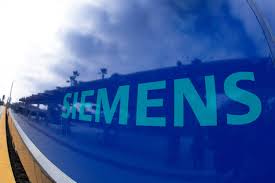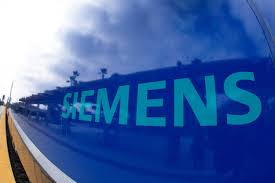
Siemens announced on Monday that it has signed a 3 billion euro ($3.25 billion) contract to supply and service freight trains in India, the largest locomotive deal in the company's history.
Siemens will deliver 1,200 electric locomotives and provide service for 35 years under the agreement, which is also the company's largest in India.
The Siemens-designed trains, with a top speed of 120 km/hr, will be assembled in India over the next 11 years, with deliveries beginning in 24 months.
"These new locomotives ... can replace between 500,000 to 800,000 trucks over their lifecycle," said Siemens Mobility CEO Michael Peter.
According to Peter, the order was a significant step forward for Siemens in India, where the company had previously primarily provided components and infrastructure.
"India is looking for technology, better efficiency, and longer lifespan for its trains," he said in an interview. "In the past India built their own trains, but they want to increase reliability and average speeds."
This is Siemens' second large contract, following a 900 million euro deal in December for a new metro line in Sydney, Australia.
Although this contract would primarily appear as orders in 2023, Peter was confident that Siemens would meet its goal of increasing revenue in the mobility business by 6-9% this year. He declined to comment further, saying that profit margins were in line with what he expected for rolling stock.
He added that Siemens was looking into other train contracts in India, the world's largest rail market, with 24 million passengers riding on more than 22,000 trains every day.
According to Siemens, whose first contact in India - a London-Calcutta telegraph line - dates back to 1867, the government in New Delhi wants to increase the rail network's share of freight transport to 40-45% from the current 27%.
(Source:www.businesstimes.com.sg)
Siemens will deliver 1,200 electric locomotives and provide service for 35 years under the agreement, which is also the company's largest in India.
The Siemens-designed trains, with a top speed of 120 km/hr, will be assembled in India over the next 11 years, with deliveries beginning in 24 months.
"These new locomotives ... can replace between 500,000 to 800,000 trucks over their lifecycle," said Siemens Mobility CEO Michael Peter.
According to Peter, the order was a significant step forward for Siemens in India, where the company had previously primarily provided components and infrastructure.
"India is looking for technology, better efficiency, and longer lifespan for its trains," he said in an interview. "In the past India built their own trains, but they want to increase reliability and average speeds."
This is Siemens' second large contract, following a 900 million euro deal in December for a new metro line in Sydney, Australia.
Although this contract would primarily appear as orders in 2023, Peter was confident that Siemens would meet its goal of increasing revenue in the mobility business by 6-9% this year. He declined to comment further, saying that profit margins were in line with what he expected for rolling stock.
He added that Siemens was looking into other train contracts in India, the world's largest rail market, with 24 million passengers riding on more than 22,000 trains every day.
According to Siemens, whose first contact in India - a London-Calcutta telegraph line - dates back to 1867, the government in New Delhi wants to increase the rail network's share of freight transport to 40-45% from the current 27%.
(Source:www.businesstimes.com.sg)





